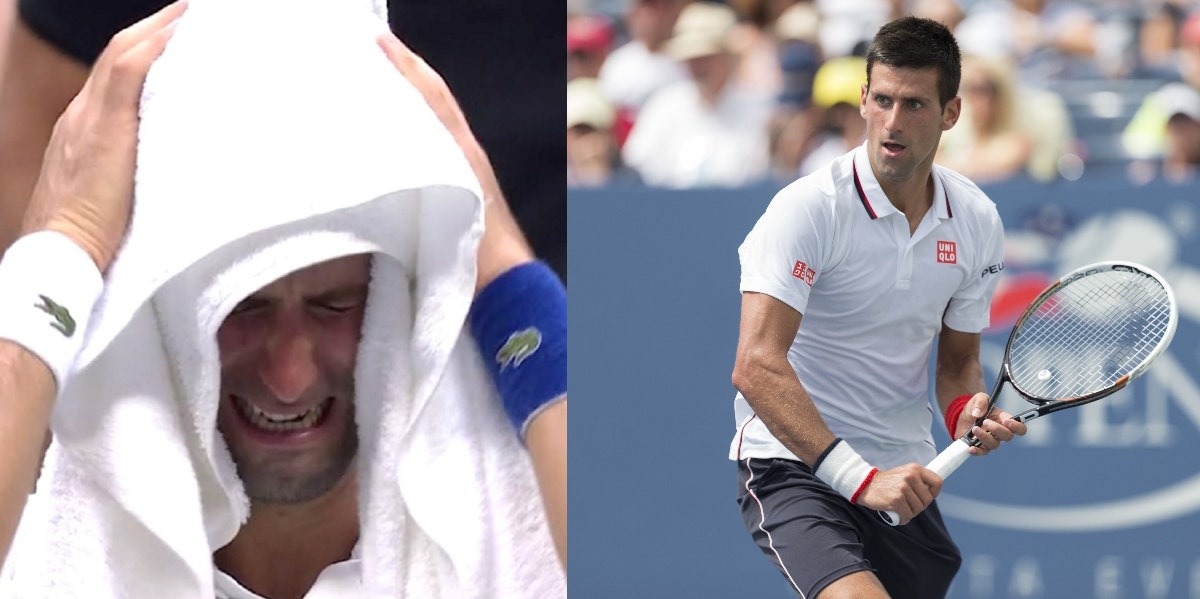Novak Djokovic Tearful US Open Match Exposes How Tennis Is Still Failing To Protect Athletes’ Mental Health
"I’ve never felt like this."
 YouTube / lev radin / Shutterstock.com
YouTube / lev radin / Shutterstock.com The US Open ended with a rare display of emotion from one of tennis’ greatest athletes.
After losing to Daniil Medvedev, and missing out on a record-breaking 21st Grand Slam title, Novak Djokovic was in tears in the New York stadium.
The world number one was met with cheers of support from the crowd in New York who he said “touched his soul.”
But, online, the reaction was significantly less sympathetic.
Fans ridiculed Novak Djokovic for crying at the US Open.
“Did anyone else get all happy when they saw Djokovic crying? I just hope he was crying because he lost,” wrote one Twitter user.
“Most satisfying moment of the year.. Novak Djokovic crying,” said another user.
While there was plenty of support for the Serbian tennis star, the reaction to his emotional display shows a vicious insensitivity towards tennis stars.
Djokovic is hated by many tennis fans.
Djokovic has long been one of tennis’ most polarizing stars. While many celebrate his talents, he faces inordinate and often inexplicable criticism from others.
He is widely considered arrogant for his on-court antics, he has been criticized for being anti-vaccines, he has disrupted years of the Roger Federer and Rafael Nadal dominance that tennis fans have gripped on to.
But regardless of your personal opinion of the man, no one should be ridiculed for showing emotion in one of the most high pressure events of their career.
Djokovic seemed painfully aware of his reputation in the US Open Final as he thanked the crowd for a rare display of support towards him.
“I’ve never felt like this in New York. I love you guys, thank you so much for the support and everything you’ve done for me tonight,” he said in a post-match speech.
It has been a tough year for the world’s top tennis stars.
From Serena Williams backing out of the Olympics to Naomi Osaka’s high-profile battle with mental illness, it is clear that the sport has taken its toll on even the strongest competitors.
Is it any wonder, then, that Djokovic was moved to tears by what he had hoped would be a history-making match?
The reaction to Djokovic shows a deep discomfort with male emotion that can have disastrous impacts on male mental health.
“We are just not at the point, yet where men, especially athletes, are allowed to cry, or show emotions like sadness,” says Keith Dent, a relationship and empowerment coach.
“A man's mental health will become more balanced if parents allow their boys to cry or be sad and defend them when they do.”
Dent also points out that Djokovic is no stranger to showing emotion on the court, we just tend to be more accepting of his usual displays of frustration.
“Athletes are definitely allowed to show anger. Case in point when Novak broke his racket on the court for missing a point everyone cheered,” Dent adds.
Accepting male anger but ridiculing male vulnerability keeps us in a dangerous cycle where men’s violence is normalized but their attempts to express emotion are not.
Tennis’ respect for an athlete's mental health still needs work.
In the stadium, Djokovic was met with cheers — unlike the reaction online — but even those cheers came at a cost.
Djokovic’s opponent, Medvedev, was viciously booed as he accepted his US Open win.
The moment echoed Naomi Osaka’s win over Serena Williams in 2018 when the young star was left in tears as the crowd booed her.
She now traces her battle with depression back to the fallout of that win.
Tennis fans have made it their mission to have a villain, whether it’s Djokovic for crying on the court, Medvedev from preventing a record-breaking win, or Osaka for doing the same.
Yet, if there’s one thing to take from Osaka’s mental health battle or Djokovic’s tears it’s that these stars still need kindness, even in the face of their success.
Alice Kelly is a senior news and entertainment editor for YourTango. Based out of Brooklyn, New York, her work covers all things social justice, pop culture, and human interest. Keep up with her Twitter for more.

